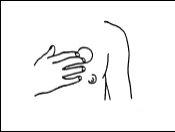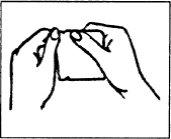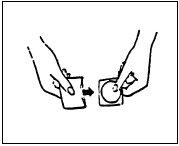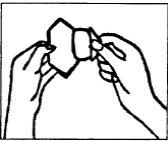
EPINITRIL 15 mg/24 H AUTOCLIVANTES TRANSDÉRMICOS
Pergunte a um médico sobre a prescrição de EPINITRIL 15 mg/24 H AUTOCLIVANTES TRANSDÉRMICOS

Como usar EPINITRIL 15 mg/24 H AUTOCLIVANTES TRANSDÉRMICOS
Introdução
PROSPECTO: INFORMAÇÃO PARA O UTILIZADOR
Epinitril 15 mg/24 h patch transdérmico
Trinitrato de glicerilo
Leia todo o prospecto detenidamente antes de começar a usar este medicamento, porque contém informações importantes para si.
- Conserva este prospecto, porque pode ter que o reler.
- Se tiver alguma dúvida, consulte o seu médico ou farmacêutico.
- Este medicamento foi-lhe prescrito apenas para si, e não deve dá-lo a outras pessoas, mesmo que tenham os mesmos sintomas que si, porque pode prejudicá-las.
- Se experimentar efeitos adversos, consulte o seu médico ou farmacêutico, mesmo que se trate de efeitos adversos que não aparecem neste prospecto. Ver secção 4
Conteúdo do prospecto:
- O que é Epinitril e para que é utilizado
- O que precisa saber antes de começar a usar Epinitril
- Como usar Epinitril
- Posíveis efeitos adversos
- Conservação de Epinitril
- Conteúdo do envase e informação adicional
1. O que é EPINITRIL e para que é utilizado
Os patches de Epinitril contêm o princípio ativo trinitrato de glicerilo, um vasodilatador que é usado nas doenças cardíacas e pertence a um grupo de fármacos denominados nitratos orgânicos.
Os patches de Epinitril são aplicados à pele e o princípio ativo passará então de forma contínua através da pele e para o organismo.
Epinitril está indicado para o tratamento preventivo da angina de peito tomado sozinho ou em combinação com outro tratamento antianginoso.
A angina normalmente apresenta-se como uma dor ou opressão no peito, embora possa notar-se no pescoço ou no braço.
A dor aparece quando o coração não está suficientemente oxigenado. Epinitril não está indicado para o tratamento dos ataques agudos. Utilize o seu comprimido ou spray sublingual para o tratamento dos ataques agudos.
Os patches de Epinitril são para uso externo apenas.
2. O que precisa saber antes de começar a usar EPINITRIL
Não useEpinitril:
- se é alérgico (hipersensível) ao trinitrato de glicerilo, nitratos orgânicos relacionados ou a algum dos outros componentes deste medicamento (incluídos na secção 6);
- se tem ou sofreu recentemente um colapso associado a hipotensão;
- se sofre dor de cabeça, vómitos ou convulsões associadas a um aumento da pressão intracraniana, incluídas as causadas por traumatismo na cabeça;
- se sofre insuficiência cardíaca por obstrução, por exemplo, na presença de um estreitamento do orifício aórtico ou do orifício auriculoventricular do coração (estenose aórtica ou estenose mitral, respetivamente) ou um engrossamento fibrótico da delgada membrana que recobre o coração (pericardite constrictiva);
- se está a tomar medicamentos para o tratamento da disfunção eréctil (p. ex., sildenafilo ou qualquer outro inibidor de PDE-5). Os nitratos não devem ser administrados a pacientes tratados com sildenafilo ou qualquer outro medicamento usado para tratar a disfunção eréctil. Os pacientes tratados atualmente com nitratos não devem tomar sildenafilo nem qualquer outro medicamento para o tratamento da disfunção eréctil. A combinação de um nitrato com sildenafilo ou qualquer outro inibidor de PDE-5 pode provocar uma redução profunda e repentina da tensão arterial, que pode produzir desmaios, perda de consciência ou mesmo um ataque cardíaco (ver também “Uso de outros medicamentos”);
- se está a tomar medicamentos com riociguat, um estimulador da guanilato ciclasa solúvel,
- se sofre uma grave baixa de tensão arterial (pressão arterial menor de 90 mmHg),
- se sofre uma baixa grave do volume de sangue corporal devido a perda de sangue ou de fluidos corporais (hipovolemia severa),
- se sofre uma anemia grave,
- se sofre uma retenção de líquidos tóxica nos pulmões (edema pulmonar tóxico).
Advertências e precauções
Consulte o seu médico ou farmacêutico antes de começar a usar Epinitril:
- se se retira do tratamento. A retirada do tratamento com Epinitril deve ser gradual, substituindo-se por doses decrescentes de nitratos orais de ação prolongada;
- se deve submeter a ressonância magnética, estimulação elétrica do coração para re-estabelecer o ritmo cardíaco normal (desfibrilhação ou cardioversão) e antes do tratamento com calor (diatermia). Retire os patches de Epinitril antes de se submeter a estes tratamentos;
- se sofre ou sofreu recentemente um ataque cardíaco (infarto de miocárdio) ou se aparecem rapidamente sintomas de insuficiência cardíaca (insuficiência cardíaca aguda) como dificuldade para respirar, sensação de muito cansaço, inchaço de pernas. O seu médico pode solicitar exames de laboratório das suas funções cardiovasculares;
- se sofre uma grave hipotensão durante o tratamento com Epinitril, deve considerar-se retirar o patch. Em caso de colapso ou choque, o patch deve ser retirado;
- se experimenta um dor no peito (ataque agudo de angina) ou se o seu coração não bombeia suficiente sangue e oxigénio (angina instável) ou em caso de ataque cardíaco (infarto de miocárdio), não deve usar Epinitril como um tratamento imediato;
- se sofre um forte dor de cabeça ou pressão arterial baixa (hipotensão) anómala. Isso pode ocorrer se a dose inicial for demasiado alta. É aconselhável aumentar a dose progressivamente até lograr o efeito óptimo;
- se está a tomar outros nitratos ou trinitrato de glicerilo sublingual, porque o seu organismo pode desenvolver uma resistência aos efeitos destas substâncias após a exposição repetida (tolerância cruzada);
- se sofre ou sofreu uma pressão arterial baixa anómala provocada pelo trinitrato de glicerilo. Neste caso, pode sofrer uma frequência cardíaca baixa (bradicardia paradójica) e um aumento da angina;
- se sofre uma doença do nervo óptico (glaucoma de ângulo fechado);
- se tem uma oxigenação insuficiente do sangue (hipoxemia) por uma anemia grave ou uma doença pulmonar ou um menor fluxo sanguíneo para o coração (insuficiência cardíaca isquémica); os pacientes com estes problemas médicos podem sofrer um desequilíbrio na relação ventilação/perfusão que é um índice da função respiratória. Nestes pacientes, o trinitrato de glicerilo pode piorar este desequilíbrio e causar uma diminuição da oxigenação do sangue;
- se a angina foi provocada por um engrossamento do coração (miocardiopatia hipertrófica). Os nitratos podem piorar este tipo de angina;
- se sofre um aumento da frequência de ataques de angina durante os períodos sem patch. Pode que o seu médico queira reavaliar a sua doença coronária e considere uma adaptação do tratamento.
- o tratamento deve ser suspenso e deve consultar com o médico se experimenta fenómenos de sensibilização da pele (picazón, queimadura, inflamação).
Uso de Epinitril com outros medicamentos
A administração concomitante de medicamentos para o tratamento da disfunção eréctil (p. ex., sildenafilo ou qualquer outro inibidor de PDE-5) potencia os efeitos reductores da tensão arterial dos nitratos e, por tanto, deve ser evitada (ver também “Não use Epinitril”).
Deve ser evitado o tratamento simultâneo com riociguat, um estimulador da guanilato ciclasa solúvel, dado que o uso simultâneo pode causar hipotensão (ver também “Não use Epinitril”)
O tratamento concomitante com
- medicamentos usados para diminuir a pressão arterial, tais como antagonistas do cálcio, inibidores da ECA (para o tratamento de insuficiência cardíaca congestiva), beta-bloqueantes (usados para prevenir as arritmias cardíacas), diuréticos, (incrementam a excreção de água desde o corpo), e outros anti-hipertensivos,
- antidepressivos tricíclicos (medicamentos usados para o tratamento da depressão),
- neurolépticos (medicamentos usados para prevenir a psicose),
- tranquilizantes maiores (sedantes), assim como o consumo de álcool e em associação com amifostina (medicamento citoprotetor em quimioterapia e radioterapia),
- ácido acetilsalicílico (um AINE),
pode potenciar os efeitos reductores da pressão arterial de Epinitril.
O tratamento simultâneo com dihidroergotamina pode diminuir o efeito de Epinitril.
Medicamentos anti-inflamatórios não esteroideos, excepto o ácido acetilsalicílico, podem diminuir a resposta terapêutica de Epinitril.
Comunique ao seu médico ou farmacêutico que está utilizando, usou recentemente ou pode ter que usar qualquer outro medicamento.
Gravidez, lactação e fertilidade
Epinitril não deve ser utilizado durante a gravidez, especialmente durante os três primeiros meses a não ser que o seu médico o tenha indicado.
Como quase não há informação sobre se o trinitrato de glicerilo se excreta no leite materno, não se pode excluir um risco na lactação. O seu médico avaliará se deve interromper a lactação ou o tratamento com Epinitril.
Não há dados do efeito de Epinitril sobre a fertilidade em humanos.
Se está grávida ou em período de lactação, acha que pode estar grávida ou tem intenção de ficar grávida, consulte o seu médico ou farmacêutico antes de utilizar este medicamento.
Condução e uso de máquinas
Ao começar, especialmente, o tratamento, ou durante o ajuste da dose, Epinitril pode influir sobre a capacidade de conduzir ou usar máquinas, reduzir a capacidade de reação ou produzir-se raramente hipotensão ortostática e mareio, assim como excepcionalmente, um síncope após sobredosagem.
Se você experimenta estes efeitos, deve abster-se de conduzir ou utilizar máquinas.
3. Como usar EPINITRIL
Siga exatamente as instruções de administração deste medicamento indicadas pelo seu médico. Em caso de dúvida, consulte novamente o seu médico ou farmacêutico.
A dose recomendada é um patch de Epinitril uma vez ao dia. Aplique o patch na pele cuidadosamente e mantenha-o durante 12-16 horas. Depois, retire o patch e mantenha um período sem patch durante as 8-12 horas restantes.
Deve mudar o seu patch de Epinitril de acordo com as instruções dadas pelo seu médico. O seu médico dir-lhe-á quanto tempo deve manter o patch na pele e a duração do intervalo sem patch.
Uso em crianças e adolescentes
Epinitril não deve ser usado em crianças nem adolescentes menores de 18 anos.
Durante quanto tempo deve usar Epinitril
O tratamento com Epinitril pode continuar durante vários anos; no entanto, o seu médico querrá vê-lo periodicamente para decidir se continua com o tratamento ou modifica a pauta terapêutica.
Como colocar o patch
Aplique o patch na pele limpa e seca, mas não em cima de cortes, manchas nem defeitos nem em zonas onde acabe de aplicar creme, hidratante ou talco. Recomenda-se aplicar Epinitril patches transdérmicos na pele do peito (ver a Figura 1) ou a parte superior externa do braço, livre de enrubescimento ou irritação, e rodar os pontos de aplicação. Se for necessário, pode raspar a zona adequada. Devem ser evitadas as zonas que formem dobras ou estejam sujeitas a fricções durante o movimento.
Figura 1

Não se aplique dois patches consecutivos no mesmo lugar.
Se aplicará um patch de Epinitril na pele assim que o retire do invólucro, da seguinte forma:
(I) Rompa o invólucro pela linha de pontos.
Não utilize tesouras (ver a Figura 2).

Figura 2
(II) Segure o patch entre o polegar e o
dedo indicador pela etiqueta que se retira
(ver a Figura 3).

Figura 3
(III) Retire o recobrimento protetor com a outra
mão (ver a Figura 4). Não toque no lado
pegajoso do patch; de outra forma, não se pegará bem.

Figura 4
(IV) Aplique a parte aberta do patch na pele
e retire a parte restante do recobrimento protetor.
Aperte com firmeza durante uns 10 segundos sobre
a superfície total do patch. Passe os dedos pelos
bordos para se assegurar de que se pegam bem.
Lave as mãos antes e depois de aplicar Epinitril.
Para retirar um patch, levante o bordo e puxe suavemente o patch até que saia. Depois de usar o patch, dobre-o ao meio, com a parte pegajosa para dentro e jogue-o no lixo, onde as crianças não possam pegá-lo.
O que fazer se o patch cair?
Se Epinitril for aplicado corretamente, é muito improvável que o patch caia. No entanto, se o patch cair, substitua-o por um novo e depois mude de novo o patch da forma habitual de acordo com o seu calendário original.
Se usar mais Epinitril do que deve
Se se administrar doses elevadas de trinitrato de glicerilo pode experimentar hipotensão grave e taquicardia refleja ou colapso e síncope, assim como alteração da hemoglobina (metahemoglobinemia). Se se aplicarem demasiados patches de uma só vez, devem ser retirados os patches cuidadosamente e lavar a pele de baixo minuciosamente para reduzir a absorção. Em caso de que experimente hipotensão ou colapso, aconselha-se elevar as pernas do paciente ou, se for necessário, aplicar um vendagem compressiva nas pernas.
Em caso de intoxicação deve informar o seu médico imediatamente, contactar imediatamente com o serviço de urgências mais próximo ou ligar para o Serviço de Informação Toxicológica, telefone 91 562 04 20, indicando o medicamento e a quantidade usada. Mostre ao seu médico o medicamento ou o invólucro vazio.
Se esquecer de mudar o patch
Se esquecer de mudar o patch no momento correto, deve substituí-lo o mais rápido possível e depois seguir o calendário original para aplicar o patch seguinte.
Se interromper o tratamento com Epinitril
Ao interromper o tratamento com Epinitril, pode voltar a experimentar ataques de angina.
Se tiver alguma outra dúvida sobre o uso deste medicamento, pergunte ao seu médico ou farmacêutico.
4. Posíveis efeitos adversos
Como todos os medicamentos, Epinitril pode produzir efeitos adversos, embora não todas as pessoas os sofram.
Foram notificados os seguintes efeitos secundários:
Efeitos adversos muito frequentes (produzem-se em mais de 1 paciente de cada 10):
- Náuseas.
- Vómitos.
Efeitos adversos frequentes (produzem-se em mais de 1 e menos de 10 pacientes de cada 100):
- Dor de cabeça.
Efeitos adversos pouco frequentes (produzem-se em mais de 1 e menos de 10 pacientes de cada 1.000):
- Inflamação na zona de contacto da pele (dermatite de contacto).
- Enrubescimento e irritação na zona de aplicação do patch.
- Picazón.
- Sensação de queimadura.
Efeitos adversos raros (produzem-se em mais de 1 e menos de 10 pacientes de cada 10.000):
- Taquicardia.
- Hipotensão ortostática (descenso da tensão arterial ao levantar-se), podem ser descritos como episódios transitórios de mareio.
- Enrubescimento da pele.
- Aumento da frequência cardíaca.
Efeitos adversos muito raros (produzem-se em menos de 1 de cada 10.000 pacientes):
- Mareio.
- Síncope.
Efeitos adversos de frequência não conhecida:
- Transtornos cardíacos (palpitação).
- Erupção cutânea generalizada (rash generalizado).
Se experimentar efeitos adversos, consulte o seu médico ou farmacêutico, mesmo que se trate de efeitos adversos que não aparecem neste prospecto
Comunicação de efeitos adversos
Se experimentar qualquer tipo de efeito adverso, consulte o seu médico ou farmacêutico, mesmo que se trate de possíveis efeitos adversos que não aparecem neste prospecto. Também pode comunicá-los diretamente através do Sistema Espanhol de Farmacovigilância de Medicamentos de Uso Humano www.notificaRAM.es
Ao comunicar efeitos adversos, você pode contribuir para proporcionar mais informações sobre a segurança deste medicamento.
.
5. Conservação de EPINITRIL
Mantenha este medicamento fora da vista e do alcance das crianças.
Não conserve a uma temperatura superior a 25°C. Epinitril deve ser guardado no seu invólucro intacto.
Não use este medicamento após a data de caducidade que aparece no invólucro e no invólucro após CAD. A data de caducidade é o último dia do mês que se indica.
Os medicamentos não devem ser jogados pelos deságues nem no lixo. Deposite os invólucros e os medicamentos que não precisa no Ponto SIGRE da farmácia. Pergunte ao seu farmacêutico como se livrar dos invólucros e dos medicamentos que já não precisa. Desta forma, ajudará a proteger o meio ambiente.
6. Conteúdo do invólucro e informação adicional
Composição de Epinitril
O princípio ativo dos patches de Epinitril é trinitrato de glicerilo e estão disponíveis em três concentrações: Epinitril 5mg/24h, 10 mg/24h e 15 mg/24h.
Epinitril 15 mg/24 h: contém 47,04 mg do princípio ativo trinitrato de glicerilo e libera cerca de 15 mg de trinitrato de glicerilo por dia (0,6 mg/h); a zona de liberação do patch é de 19,12 cm2. O código de identificação impresso na lâmina de suporte é NR15.
Os demais componentes são uma substância adesiva (copolímero acrilato-vinilacetato), um taquificante (ftalato de hidroabietilo) e um reticulante (polibutiltitanato), que se têm estendido juntamente com o princípio ativo em uma lâmina de suporte (lâmina de polipropileno lacada). A camada adesiva está coberta por um recobrimento protetor de alumínio e silicona nos dois lados que se retira antes do uso.
Aspecto do produto e conteúdo do envase
Epinitril são patches transdérmicos com a parte posterior adesiva. Cada patch está selado de forma individual em um sobrecarte protector.
Tamanhos de envase: 15 e 30 patches. Pode ser que apenas alguns tamanhos de envases estejam comercializados.
Titular da autorização de comercialização e responsável pela fabricação
Titular da autorização de comercialização
Viatris Healthcare Limited
Parque Industrial Damastown
Mulhuddart, Dublín 15
Dublín
Irlanda
Responsável pela fabricação
ROTTAPHARM Ltd.
Damastown, Parque Industrial, Mulhuddart
Dublín 15
Irlanda.
Ou
LTS Lohmann Therapie Systeme AG
Lohmannstraße 2
56626 Andernach
Alemanha
Podem solicitar mais informações sobre este medicamento dirigindo-se ao representante local do titular da autorização de comercialização:
Viatris Pharmaceuticals, S.L.
Rua General Aranaz, 86
28027 - Madrid
Espanha
Data da última revisão deste prospecto:dezembro 2022
A informação detalhada e atualizada sobre este medicamento está disponível na página Web da Agência Espanhola de Medicamentos e Produtos Sanitários (AEMPS) http://www.aemps.gob.es/

Quanto custa o EPINITRIL 15 mg/24 H AUTOCLIVANTES TRANSDÉRMICOS em Espanha em 2025?
O preço médio do EPINITRIL 15 mg/24 H AUTOCLIVANTES TRANSDÉRMICOS em dezembro de 2025 é de cerca de 23.14 EUR. Os valores podem variar consoante a região, a farmácia e a necessidade de receita. Confirme sempre com uma farmácia local ou fonte online para obter informações atualizadas.
- País de registo
- Preço médio em farmácia23.14 EUR
- Substância ativa
- Requer receita médicaSim
- Fabricante
- Esta informação é apenas para referência e não constitui aconselhamento médico. Consulte sempre um médico antes de tomar qualquer medicamento. A Oladoctor não se responsabiliza por decisões médicas baseadas neste conteúdo.
- Alternativas a EPINITRIL 15 mg/24 H AUTOCLIVANTES TRANSDÉRMICOSForma farmacêutica: ADESIVO TRANSDÉRMICO, 37,4 mg de nitroglicerinaSubstância ativa: glyceryl trinitrateFabricante: Merus Labs Luxco Ii S.À.R.L.Requer receita médicaForma farmacêutica: ADESIVO TRANSDÉRMICO, 18,7 mg de nitroglicerinaSubstância ativa: glyceryl trinitrateFabricante: Merus Labs Luxco Ii S.À.R.L.Requer receita médicaForma farmacêutica: ADESIVO TRANSDÉRMICO, 31,37 mgSubstância ativa: glyceryl trinitrateFabricante: Casen Recordati S.L.Requer receita médica
Alternativas a EPINITRIL 15 mg/24 H AUTOCLIVANTES TRANSDÉRMICOS noutros países
As melhores alternativas com o mesmo princípio ativo e efeito terapêutico.
Alternativa a EPINITRIL 15 mg/24 H AUTOCLIVANTES TRANSDÉRMICOS em Poland
Alternativa a EPINITRIL 15 mg/24 H AUTOCLIVANTES TRANSDÉRMICOS em Ukraine
Médicos online para EPINITRIL 15 mg/24 H AUTOCLIVANTES TRANSDÉRMICOS
Avaliação de posologia, efeitos secundários, interações, contraindicações e renovação da receita de EPINITRIL 15 mg/24 H AUTOCLIVANTES TRANSDÉRMICOS – sujeita a avaliação médica e regras locais.










